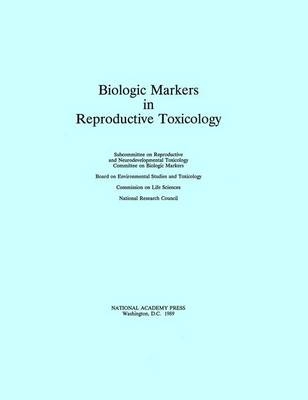
Biologic Markers in Reproductive Toxicology
National Academies Press (Verlag)
978-0-309-03979-6 (ISBN)
- Titel ist leider vergriffen;
keine Neuauflage - Artikel merken
Does exposure to environmental toxicants inhibit our ability to have healthy children who develop normally? Biologic markers—indicators that can tell us when environmental factors have caused a change at the cellular or biochemical level that might affect reproductive ability—are a promising tool for research aimed at answering that important question. Biologic Markers in Reproductive Toxicology examines the potential of these markers in environmental health studies; clarifies definitions, underlying concepts, and possible applications; and shows the benefits to be gained from their use in reproductive and neurodevelopmental research.
Table of Contents
Front Matter
Executive Summary
1. Report of the Oversight Committee
I. Biologic Markers in Male Reproductive and Gametic Genetic Toxicology
2. Introduction
3. Clinical Evaluation of Male Infertility
4. Biologic Markers of Testicular Function
5. Biologic Markers of Epididymal Structure and Function
6. Biologic Markers of Accessory Sex Organ Structure and Function
7. Biologic Markers of Human Male Reproductive Health and Physiologic Damage
8. Assessing Transmitted Mutations in Mice
9. Markers for Measuring Germinal Genetic Toxicity and Heritable Mutations in People
10. Conclusions and Recommendations
II. Biologic Markers in Female Reproductive Toxicology
11. Introduction
12. Biologic Markers of Genetic Damage in Females
13. Biologic Markers of Reproductive Development and Aging
14. Biologic Markers of Nonconceptive Menstrual Cycles
15. Developing Assays of Biologic Markers for Epidemiologic Studies: Experience with a Marker of Pregnancy and Early Loss
16. Conclusions and Recommendations
III. Biologic Markers of Toxicity during Pregnancy
17. Introduction
18. Molecular Biology: Developing DNA Markers of Genotoxic Effects
19. Reproductive Immunology: Biologic Markers of Compromised Pregnancies
20. Cell Biology: Identifying Biologic Markers Expressed during Early Pregnancy
21. Physiologic Assessment of Fetal Compromise
22. Biologic Markers of Exposure during Pregnancy: Pharmacokinetic Assessments
23. Conclusions and Recommendations
IV. Biologic Markers in Neurodevelopmental Toxicology
24. Introduction
25. Developmental Neurobiology of the Central Nervous System
26. Morphologic, Neurochemical, and Behavioral Responses to Toxic Agents
27. Methodologic Issues of Extrapolation from Animal Studies to Human Toxicant Exposure
28. Lead as a Paradigm for the Study of Neurodevelopmental Toxicology
29. Conclusions and Recommendations
Appendix: Assessing the Validity of Biologic Markers: Alpha-Fetoprotein
References
Biographies
Index
Subcommittee on Reproductive and Neurodevelopmental Toxicology, Committee on Biologic Markers, Board on Environmental Studies and Toxicology, National Research Council
1 Front Matter; 2 Executive Summary; 3 1. Report of the Oversight Committee; 4 I. Biologic Markers in Male Reproductive and Gametic Genetic Toxicology; 5 2. Introduction; 6 3. Clinical Evaluation of Male Infertility; 7 4. Biologic Markers of Testicular Function; 8 5. Biologic Markers of Epididymal Structure and Function; 9 6. Biologic Markers of Accessory Sex Organ Structure and Function; 10 7. Biologic Markers of Human Male Reproductive Health and Physiologic Damage; 11 8. Assessing Transmitted Mutations in Mice; 12 9. Markers for Measuring Germinal Genetic Toxicity and Heritable Mutations in People; 13 10. Conclusions and Recommendations; 14 II. Biologic Markers in Female Reproductive Toxicology; 15 11. Introduction; 16 12. Biologic Markers of Genetic Damage in Females; 17 13. Biologic Markers of Reproductive Development and Aging; 18 14. Biologic Markers of Nonconceptive Menstrual Cycles; 19 15. Developing Assays of Biologic Markers for Epidemiologic Studies: Experience with a Marker of Pregnancy and Early Loss; 20 16. Conclusions and Recommendations; 21 III. Biologic Markers of Toxicity during Pregnancy; 22 17. Introduction; 23 18. Molecular Biology: Developing DNA Markers of Genotoxic Effects; 24 19. Reproductive Immunology: Biologic Markers of Compromised Pregnancies; 25 20. Cell Biology: Identifying Biologic Markers Expressed during Early Pregnancy; 26 21. Physiologic Assessment of Fetal Compromise; 27 22. Biologic Markers of Exposure during Pregnancy: Pharmacokinetic Assessments; 28 23. Conclusions and Recommendations; 29 IV. Biologic Markers in Neurodevelopmental Toxicology; 30 24. Introduction; 31 25. Developmental Neurobiology of the Central Nervous System; 32 26. Morphologic, Neurochemical, and Behavioral Responses to Toxic Agents; 33 27. Methodologic Issues of Extrapolation from Animal Studies to Human Toxicant Exposure; 34 28. Lead as a Paradigm for the Study of Neurodevelopmental Toxicology; 35 29. Conclusions and Recommendations; 36 Appendix: Assessing the Validity of Biologic Markers: Alpha-Fetoprotein; 37 References; 38 Biographies; 39 Index
| Erscheint lt. Verlag | 1.7.1989 |
|---|---|
| Verlagsort | Washington |
| Sprache | englisch |
| Maße | 178 x 254 mm |
| Themenwelt | Studium ► 1. Studienabschnitt (Vorklinik) ► Histologie / Embryologie |
| Studium ► 2. Studienabschnitt (Klinik) ► Pharmakologie / Toxikologie | |
| ISBN-10 | 0-309-03979-7 / 0309039797 |
| ISBN-13 | 978-0-309-03979-6 / 9780309039796 |
| Zustand | Neuware |
| Haben Sie eine Frage zum Produkt? |
aus dem Bereich


